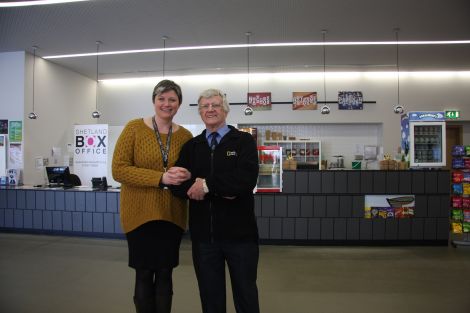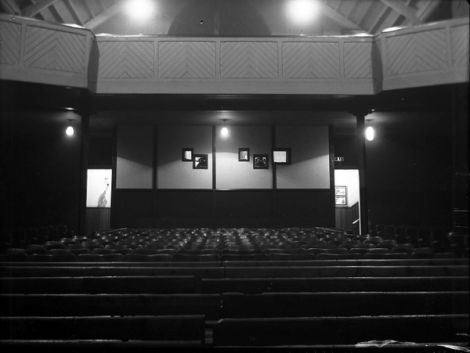Features / Ex North Star manager reflects on changed days
FOR ANY Shetlanders born much beyond the early 1980s the opportunity to visit the cinema in their home island has only been an option for the past 20 months or so.
But countless others well remember the days of the old North Star cinema – and some older generations may also remember Alex Greig, who managed the Harbour Street picture house for seven years in the late fifties and early sixties.
Greig, who is now 84, has spent the past week back in the islands visiting 105 year old Ruby Lindsay, the “remarkable” woman who ran the Bona Vista guest house where he lived for the entirety of his stay in Shetland. She sadly passed away on Tuesday evening.
In between visits to Lindsay in Lunna, where he found her to be “exceedingly frail, but the mind was so crystal clear”, he also fitted in a trip to Mareel.
The modern arts venue’s two cinemas restored the big screen to the isles’ cultural life after a gap of nearly quarter of a century when it opened in August 2012.
Even if the so-called honeymoon period partly explains why Shetlanders in 2013 visited the cinema an average of four times per head, there’s no doubt the silver screen has swiftly been embraced – to Greig’s evident pleasure.
“I’ve been in touch with Mareel off and on ever since they started building,” he says. “They gave me the guided tour the other day and I was so impressed.
“From the outside the building doesn’t look all that interesting, but once you get inside, every corner you turn… the great high windows just fill the place with light and give it a wonderful atmosphere.
“On the technical side the two cinemas in there are absolutely superb: lovely, comfortable chairs, all the latest equipment, of course the recording studios, the concert hall – absolutely stunning.
Become a member of Shetland News
“I know they had their teething problems to start with, but long term it’s got a great future.”
Greig left school early to become a cinema projectionist in his native Blairgowrie, Perthshire (“my mother went ballistic – she wanted me to stay on at school”), going on to spend some 55 years working in the industry.
Latterly in Glasgow he ran the city’s famous Odeon in Renfrew Street where illustrious visitors included The Beatles, The Rolling Stones and Dusty Springfield.
He was first employed by J.B. Milne, who owned several cinemas in and around Dundee, and by the mid-fifties his employer was keen for him to go into management. Greig resisted, saying he didn’t want the responsibility, but one day was summoned to the company’s Tay Street offices and told: “It’s time you moved on, you need to further your skills. I’m sending you to Shetland.”
Before he knew it Greig found himself walking off the ferry in Lerwick on 24 December to be met by Hughie Crooks, a well-known Shetland Times reporter of the day. “I was at Hughie’s house that night, and he could not believe a company would send a man away on Christmas Eve!”
Ensconced at Bona Vista on Church Road, he fondly remembers walking along Commercial Street to work each morning: “Nine out of 10 people spoke to me and I spoke to them – everybody knew everybody else in those days. They were so warm and welcome.
“There was Ray Hood, Willie Hunter I knew, Basil Wishart at the Times; Hughie Crooks was a great friend of mine, he came from the same place I was born. There were umpteen characters.
“I joined the brass band, got involved in the inter county, the swimming regatta – Shetland is unique in that you have to join in to be accepted. If you don’t you just stay as an outsider, and I’m very pleased to say I got stuck in and I’ve kept in touch with a load of my friends.”
Reflecting on his days at Harbour Street (the site now hosts a block of flats) during his Mareel visit, Greig couldn’t help but be struck by the scale of change – both technically and in people’s social habits.
“It’s a far cry from the old North Star, I can tell you,” he says. “There’s hundreds of differences. In my time the cinema was all on a nitrate, then it moved on to safety film.
“We used to have to depend on the boat coming in and bringing in the programme with it. We always had a spare film down in the basement in case the boat didn’t get in and we didn’t have a film to show.”
There was no television in Shetland at the time, and Greig recalls how cinema was almost an unbreakable habit for many islanders.
“You could set your watch by the time customers would come along,” he says. “In my day you had three programmes a week and it was very much a habit. Some of the locals came three times a week.
“Monday night: a new film. Wednesday night – we’ll go to the movies. They were great cinema-goers. It was a night out – what else would you do?You could sit in and listen to the radio, but the social life in Shetland was phenomenal.
“Some of the parties went on all night long, and the cinema was just part of the social life.
“It’s a lot different now. People are very selective now; they want to see a set film. We used to just open the doors, stand up and let the queues rush in – you’ve got to promote your business now.”
Become a member of Shetland News
Shetland News is asking its many readers to consider paying for membership to get additional features and services: -
- Remove non-local ads;
- Bookmark posts to read later;
- Exclusive curated weekly newsletter;
- Hide membership messages;
- Comments open for discussion.
If you appreciate what we do and feel strongly about impartial local journalism, then please become a member of Shetland News by either making a single payment, or setting up a monthly, quarterly or yearly subscription.






























































